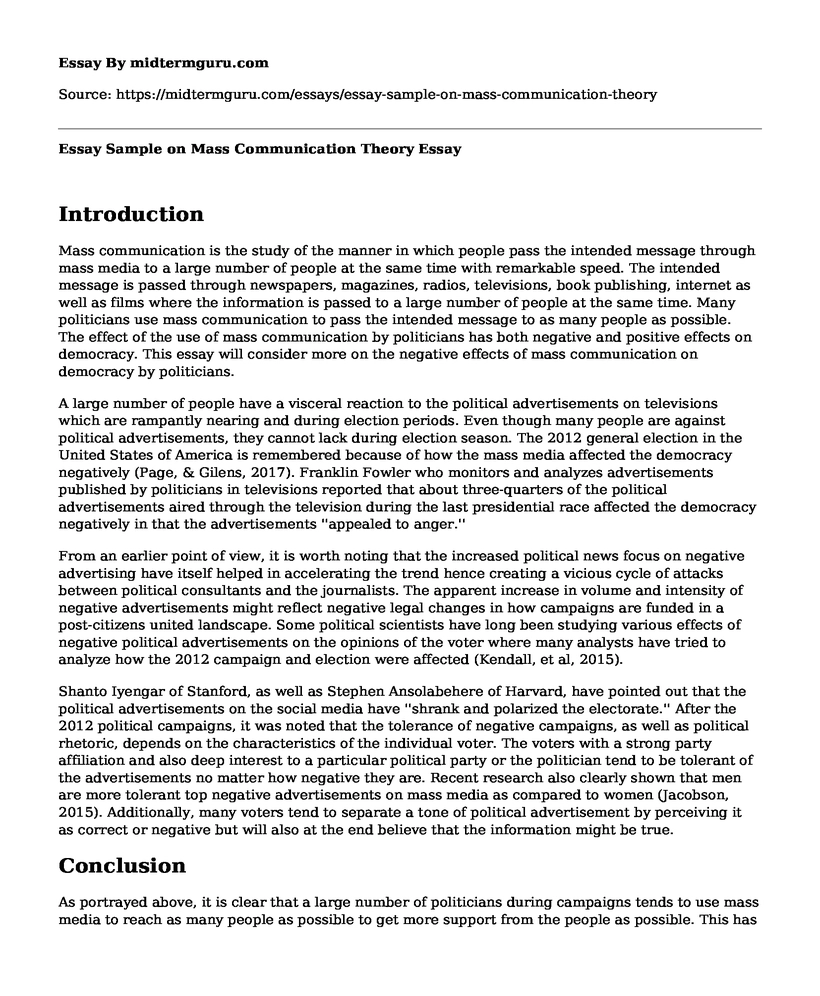Introduction
Mass communication is the study of the manner in which people pass the intended message through mass media to a large number of people at the same time with remarkable speed. The intended message is passed through newspapers, magazines, radios, televisions, book publishing, internet as well as films where the information is passed to a large number of people at the same time. Many politicians use mass communication to pass the intended message to as many people as possible. The effect of the use of mass communication by politicians has both negative and positive effects on democracy. This essay will consider more on the negative effects of mass communication on democracy by politicians.
A large number of people have a visceral reaction to the political advertisements on televisions which are rampantly nearing and during election periods. Even though many people are against political advertisements, they cannot lack during election season. The 2012 general election in the United States of America is remembered because of how the mass media affected the democracy negatively (Page, & Gilens, 2017). Franklin Fowler who monitors and analyzes advertisements published by politicians in televisions reported that about three-quarters of the political advertisements aired through the television during the last presidential race affected the democracy negatively in that the advertisements ''appealed to anger.''
From an earlier point of view, it is worth noting that the increased political news focus on negative advertising have itself helped in accelerating the trend hence creating a vicious cycle of attacks between political consultants and the journalists. The apparent increase in volume and intensity of negative advertisements might reflect negative legal changes in how campaigns are funded in a post-citizens united landscape. Some political scientists have long been studying various effects of negative political advertisements on the opinions of the voter where many analysts have tried to analyze how the 2012 campaign and election were affected (Kendall, et al, 2015).
Shanto Iyengar of Stanford, as well as Stephen Ansolabehere of Harvard, have pointed out that the political advertisements on the social media have ''shrank and polarized the electorate.'' After the 2012 political campaigns, it was noted that the tolerance of negative campaigns, as well as political rhetoric, depends on the characteristics of the individual voter. The voters with a strong party affiliation and also deep interest to a particular political party or the politician tend to be tolerant of the advertisements no matter how negative they are. Recent research also clearly shown that men are more tolerant top negative advertisements on mass media as compared to women (Jacobson, 2015). Additionally, many voters tend to separate a tone of political advertisement by perceiving it as correct or negative but will also at the end believe that the information might be true.
Conclusion
As portrayed above, it is clear that a large number of politicians during campaigns tends to use mass media to reach as many people as possible to get more support from the people as possible. This has however negatively affected the democracy as the advertisements in one way or the other changes the perception of people to different politicians or the political parties which they belong to. The researchers have reported that the largest percentage of political advertisements on television, for example, have a negative change to the opinions of the voters in the specific country. The information which they air through the mass media is described to appeal anger in respective countries. However, since political advertisements are not evadable, politicians should be cautioned not to use any language on social media that can cause any form of hatred and division among different people as well as their communities. By doing so, the negative effects of the use of mass communication by politicians or their political parties to the democracy will be avoided to a great extent.
Reference
Jacobson, G. C. (2015). How do campaigns matter?. Annual Review of Political Science, 18, 31-47.
Kendall, C., Nannicini, T., & Trebbi, F. (2015). How do voters respond to information? Evidence from a randomized campaign. American Economic Review, 105(1), 322-53.
Page, B. I., & Gilens, M. (2017). Democracy in America?: What Has Gone Wrong and what We Can Do about it. University of Chicago Press.
Cite this page
Essay Sample on Mass Communication Theory. (2022, Oct 03). Retrieved from https://midtermguru.com/essays/essay-sample-on-mass-communication-theory
If you are the original author of this essay and no longer wish to have it published on the midtermguru.com website, please click below to request its removal:
- Essay on the Role of Musicians in Modern Society
- Effect of Media Images on a Culture - Essay Example
- Pablo Picasso: Creator of Les Demoiselles D'Avignon & Pioneer of Cubism - Essay Sample
- Movie Analysis Essay on Blade II
- Betty Foy Sanders' Art Center at Georgia Southern University - Essay Sample
- Movie Analysis Essay on Journey With George
- Movie Analysis Essay on Hairspray







